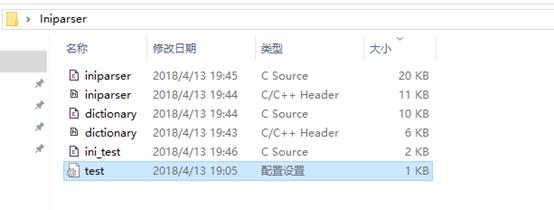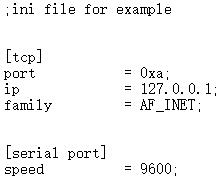INI文件解析源码及使用简介
Posted 忠诚的卫士
tags:
篇首语:本文由小常识网(cha138.com)小编为大家整理,主要介绍了INI文件解析源码及使用简介相关的知识,希望对你有一定的参考价值。
一:环境配置
1、 下载函数库:
链接:https://pan.baidu.com/s/1ZOpa2og_QQy-MnHNQg7N1w 密码:neez
2、解压文件会得到以下文件,其中dictionary.h、iniparser.h 、dictionary.c 、iniparser.c为对应的库文件,ini_test为测试函数,test.ini为需要解析的配置文件。

3、 该代码已经分别在windows系统下VisualStudio 和 Ubuntu系统下eclipse进行了测试,都能成功运行。只需分别将头文件和源文件添加到新建的工程中即可。运行之前先要把Init_test中 iniparser_load("/.../test.ini")函数的路径改成和 配置文件test.ini实际存储位置一致。
二:函数介绍
1、 INI文件格式
INI文件由3个重要的部分组成:段(section) ,参数(parameters),和注释(comments).其格式如下:
段(section)
[section]
参数(parameters)
key = value;
注释(comments)
;comments
如解压得到的test.ini文件内容:

2、 常用函数简介:
/* * iniparser.h * * Created on: Apr 13, 2018 * Author: lgh */ #ifndef INIPARSER_H_ #define INIPARSER_H_ #include <stdio.h> #include <stdlib.h> #include <string.h> #include <unistd.h> #include "dictionary.h" /*-------------------------------------------------------------------------*/ /** @brief Get number of sections in a dictionary @param d Dictionary to examine @return int Number of sections found in dictionary This function returns the number of sections found in a dictionary. The test to recognize sections is done on the string stored in the dictionary: a section name is given as "section" whereas a key is stored as "section:key", thus the test looks for entries that do not contain a colon. This clearly fails in the case a section name contains a colon, but this should simply be avoided. This function returns -1 in case of error. */ /*--------------------------------------------------------------------------*/ int iniparser_getnsec(dictionary * d); /*-------------------------------------------------------------------------*/ /** @brief Get name for section n in a dictionary. @param d Dictionary to examine @param n Section number (from 0 to nsec-1). @return Pointer to char string This function locates the n-th section in a dictionary and returns its name as a pointer to a string statically allocated inside the dictionary. Do not free or modify the returned string! This function returns NULL in case of error. */ /*--------------------------------------------------------------------------*/ char * iniparser_getsecname(dictionary * d, int n); /*-------------------------------------------------------------------------*/ /** @brief Save a dictionary to a loadable ini file @param d Dictionary to dump @param f Opened file pointer to dump to @return void This function dumps a given dictionary into a loadable ini file. It is Ok to specify @c stderr or @c stdout as output files. */ /*--------------------------------------------------------------------------*/ void iniparser_dump_ini(dictionary * d, FILE * f); /*-------------------------------------------------------------------------*/ /** @brief Save a dictionary section to a loadable ini file @param d Dictionary to dump @param s Section name of dictionary to dump @param f Opened file pointer to dump to @return void This function dumps a given section of a given dictionary into a loadable ini file. It is Ok to specify @c stderr or @c stdout as output files. */ /*--------------------------------------------------------------------------*/ void iniparser_dumpsection_ini(dictionary * d, char * s, FILE * f); /*-------------------------------------------------------------------------*/ /** @brief Dump a dictionary to an opened file pointer. @param d Dictionary to dump. @param f Opened file pointer to dump to. @return void This function prints out the contents of a dictionary, one element by line, onto the provided file pointer. It is OK to specify @c stderr or @c stdout as output files. This function is meant for debugging purposes mostly. */ /*--------------------------------------------------------------------------*/ void iniparser_dump(dictionary * d, FILE * f); /*-------------------------------------------------------------------------*/ /** @brief Get the number of keys in a section of a dictionary. @param d Dictionary to examine @param s Section name of dictionary to examine @return Number of keys in section */ /*--------------------------------------------------------------------------*/ int iniparser_getsecnkeys(dictionary * d, char * s); /*-------------------------------------------------------------------------*/ /** @brief Get the number of keys in a section of a dictionary. @param d Dictionary to examine @param s Section name of dictionary to examine @return pointer to statically allocated character strings This function queries a dictionary and finds all keys in a given section. Each pointer in the returned char pointer-to-pointer is pointing to a string allocated in the dictionary; do not free or modify them. This function returns NULL in case of error. */ /*--------------------------------------------------------------------------*/ char ** iniparser_getseckeys(dictionary * d, char * s); /*-------------------------------------------------------------------------*/ /** @brief Get the string associated to a key @param d Dictionary to search @param key Key string to look for @param def Default value to return if key not found. @return pointer to statically allocated character string This function queries a dictionary for a key. A key as read from an ini file is given as "section:key". If the key cannot be found, the pointer passed as \'def\' is returned. The returned char pointer is pointing to a string allocated in the dictionary, do not free or modify it. */ /*--------------------------------------------------------------------------*/ char * iniparser_getstring(dictionary * d, const char * key, char * def); /*-------------------------------------------------------------------------*/ /** @brief Get the string associated to a key, convert to an int @param d Dictionary to search @param key Key string to look for @param notfound Value to return in case of error @return integer This function queries a dictionary for a key. A key as read from an ini file is given as "section:key". If the key cannot be found, the notfound value is returned. Supported values for integers include the usual C notation so decimal, octal (starting with 0) and hexadecimal (starting with 0x) are supported. Examples: - "42" -> 42 - "042" -> 34 (octal -> decimal) - "0x42" -> 66 (hexa -> decimal) Warning: the conversion may overflow in various ways. Conversion is totally outsourced to strtol(), see the associated man page for overflow handling. Credits: Thanks to A. Becker for suggesting strtol() */ /*--------------------------------------------------------------------------*/ int iniparser_getint(dictionary * d, const char * key, int notfound); /*-------------------------------------------------------------------------*/ /** @brief Get the string associated to a key, convert to a double @param d Dictionary to search @param key Key string to look for @param notfound Value to return in case of error @return double This function queries a dictionary for a key. A key as read from an ini file is given as "section:key". If the key cannot be found, the notfound value is returned. */ /*--------------------------------------------------------------------------*/ double iniparser_getdouble(dictionary * d, const char * key, double notfound); /*-------------------------------------------------------------------------*/ /** @brief Get the string associated to a key, convert to a boolean @param d Dictionary to search @param key Key string to look for @param notfound Value to return in case of error @return integer This function queries a dictionary for a key. A key as read from an ini file is given as "section:key". If the key cannot be found, the notfound value is returned. A true boolean is found if one of the following is matched: - A string starting with \'y\' - A string starting with \'Y\' - A string starting with \'t\' - A string starting with \'T\' - A string starting with \'1\' A false boolean is found if one of the following is matched: - A string starting with \'n\' - A string starting with \'N\' - A string starting with \'f\' - A string starting with \'F\' - A string starting with \'0\' The notfound value returned if no boolean is identified, does not necessarily have to be 0 or 1. */ /*--------------------------------------------------------------------------*/ int iniparser_getboolean(dictionary * d, const char * key, int notfound); /*-------------------------------------------------------------------------*/ /** @brief Set an entry in a dictionary. @param ini Dictionary to modify. @param entry Entry to modify (entry name) @param val New value to associate to the entry. @return int 0 if Ok, -1 otherwise. If the given entry can be found in the dictionary, it is modified to contain the provided value. If it cannot be found, -1 is returned. It is Ok to set val to NULL. */ /*--------------------------------------------------------------------------*/ int iniparser_set(dictionary * ini, const char * entry, const char * val); /*-------------------------------------------------------------------------*/ /** @brief Delete an entry in a dictionary @param ini Dictionary to modify @param entry Entry to delete (entry name) @return void If the given entry can be found, it is deleted from the dictionary. */ /*--------------------------------------------------------------------------*/ void iniparser_unset(dictionary * ini, const char * entry); /*-------------------------------------------------------------------------*/ /** @brief Finds out if a given entry exists in a dictionary @param ini Dictionary to search @param entry Name of the entry to look for @return integer 1 if entry exists, 0 otherwise Finds out if a given entry exists in the dictionary. Since sections are stored as keys with NULL associated values, this is the only way of querying for the presence of sections in a dictionary. */ /*--------------------------------------------------------------------------*/ int iniparser_find_entry(dictionary * ini, const char * entry); /*-------------------------------------------------------------------------*/ /** @brief Parse an ini file and return an allocated dictionary object @param ininame Name of the ini file to read. @return Pointer to newly allocated dictionary This is the parser for ini files. This function is called, providing the name of the file to be read. It returns a dictionary object that should not be accessed directly, but through accessor functions instead. The returned dictionary must be freed using iniparser_freedict(). */ /*--------------------------------------------------------------------------*/ dictionary * iniparser_load(const char * ininame); /*-------------------------------------------------------------------------*/ /** @brief Free all memory associated to an ini dictionary @param d Dictionary to free @return void Free all memory associated to an ini dictionary. It is mandatory to call this function before the dictionary object gets out of the current context. */ /*--------------------------------------------------------------------------*/ void iniparser_freedict(dictionary * d); #endif /* INIPARSER_H_ */
以上是关于INI文件解析源码及使用简介的主要内容,如果未能解决你的问题,请参考以下文章
Android 逆向类加载器 ClassLoader ( 类加载器源码简介 | BaseDexClassLoader | DexClassLoader | PathClassLoader )(代码片段